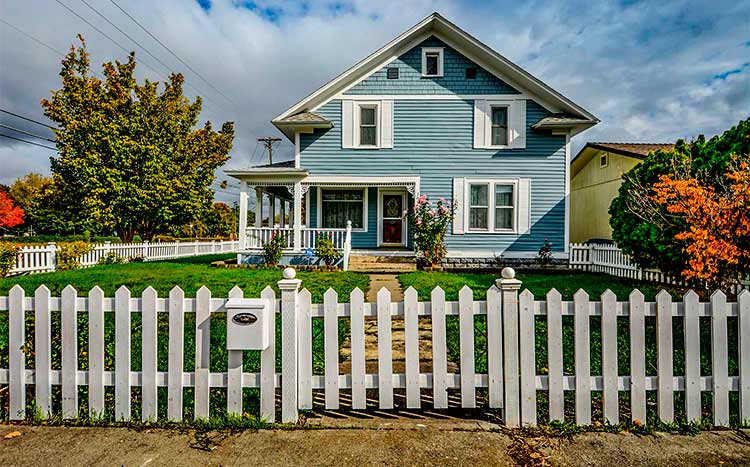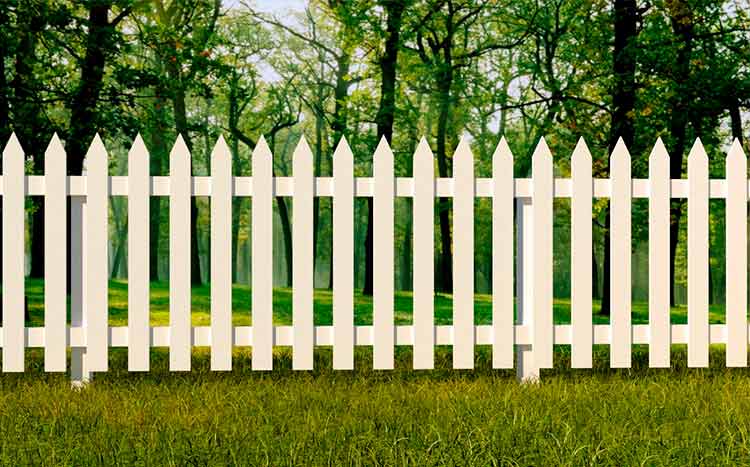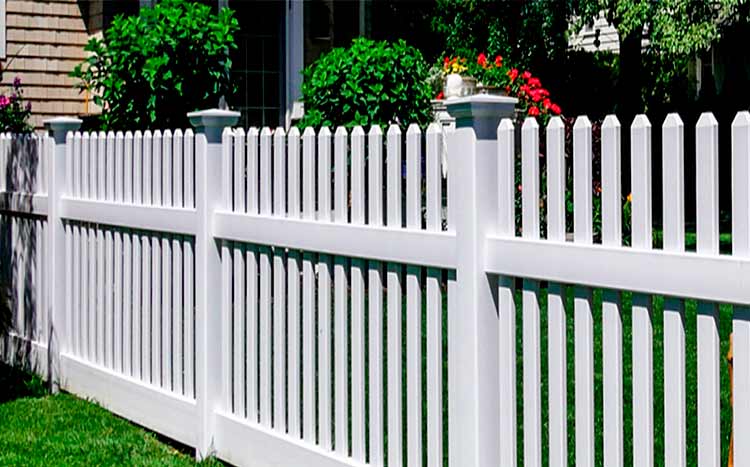Before installing or removing a fence along your property boundary in New Hampshire, it’s wise to familiarize yourself with the applicable regulations.
We cover encroachment laws, how close to a neighbor can build a fence to your property line and visa versa, as well as privacy fence height restrictions.
What we cover
ToggleHow close to the property line can I build a fence in New Hampshire?
It is recommended by the Building Department of New Hampshire that all fences be erected 3 feet from the property line. There is no ordinance regarding which side of the fence must face outwards.
Do I need a permit to build a fence in New Hampshire?
No. While the permitting regulations vary in each county, most authorities won’t demand a permit for fences 6 feet or shorter. Other ordinances, however, require a building permit for the installation of any fence.
If the fence is situated in a Historic District, you’ll need to obtain a building permit from the planning department. When unsure, check with the building inspector in your area to confirm whether you’ll need a permit.
Note; In areas where a permit isn’t required, the fence will still be subject to the local fence ordinances in your neighborhood.
Can I replace an existing fence without a permit?
According to most township regulations, no. For any fence replacement, including when using similar materials, height, and location, you’ll need to obtain a building permit. You might also need a permit to conduct any repairs resulting in significant fence additions.
Failure to get the permit may attract hefty fines and penalties depending on the county’s laws.

How tall can a privacy fence be in New Hampshire?
In general, the maximum fence height allowed in New Hampshire is 6 feet on the side and rear of the property lines. Front yard fences are expected to be at most 4 feet and should be at least 50% open, e.g., chain link.
Some fences can also be taller than the recommended 6 feet if the owners apply for a variance.
Who owns the fence on property lines in NH?
According to the N.H. Rev. Stat. § 473:1, each adjoining neighbor whose property is separated by the boundary fence is considered an equal owner. This implies that each neighbor is responsible for the repairs and maintenance of the fence.
There’s usually a written ownership agreement with details regarding the fence-sharing roles of each neighbor on your town’s records. Successors or future owners of your property will be considered joint owners of that fence based on these agreements.
How do you know where the property boundary is?
If you don’t know where your property boundaries are located, your first stop should be your neighbors. Ask them whether they know the location of the boundary lines.
You can also find details of your property boundary on your deed or plat maps of your local area. Where tension is high, hiring a surveyor to define your property boundaries is the best way to get accurate results.
Can my neighbor build a fence on the property line?
Yes! There’s no law prohibiting your neighbor from building a fence on the property line. However, they’ll need to consult and maybe send you notice first before starting the process.
If you disagree with the neighbor regarding that fence, the neighbor can apply for fence viewers who will come and help resolve the matter. Disputes regarding the division fences can also be resolved through acquiescence or usage.
Can I put up a fence on my side of the property line?
Yes. If you want to build a privacy fence on your property, nobody will stop you. However, most county regulations recommend that you maintain a setback distance of at least 3 feet from the property line.
You’ll also have to adhere to the fence height restrictions set by your local town or city.
For adjoining property owners who don’t know the actual location of their boundary fence, the law under N.H. Rev. Stat. § 473:3, allows the neighbors to recognize a long-standing boundary as the true boundary between their properties (even if it contradicts with the actual deed boundary) if they’ve lived on that lot of land for more than 20 years (boundary by acquiescence).

What is a spite fence?
A spite fence is any fence, usually overly tall and ugly, constructed by a property owner looking to annoy or harm their neighbor.
In New Hampshire, any fence taller than 5 feet in height can be considered a private nuisance if it injures or affects a neighbor’s enjoyment of their property.
The victims of such fences can, therefore, take legal action against the fence owners so that the court can issue an injunction against them.
New Hampshire fence law basics
New Hampshire laws recognize a legal fence as one of reasonable height for its purpose and in good repair. This could be timber, barbed wire, rails, boards, stone walls, etc.
When it comes to the ownership of the boundary fences, adjoining neighbors are under law required to split the costs of maintaining and repairing the fence.
However, the property owners are also free to make agreements regarding fence ownership.
If any neighbor disputes the fence contributions, the complaining neighbor may make the repairs required and then seek compensation from the non-compliant neighbor.
Local ordinance and zoning rules
Even though New Hampshire has revised statutes covering partition fences, there are numerous other ordinances that govern your fence laws.
Different counties, neighborhoods, and Homeowners Associations have varying rules which will determine how you will handle fence disputes. There are also several court-made laws that govern popular disputes like spite fences and other private nuisances.
As such, it’s always a good idea to consult the local county office regarding your fencing disputes. They will always update you whenever there are any changes to your area’s zoning laws.
Using Fence Viewers for Dispute Resolution
Under N.H. Rev. Stat. § 473:4, property owners in New Hampshire have the right to apply for a fence viewer to help them resolve their disputes. The fence viewers are to act as neutral third parties throughout the whole process.
If you’re ever in a dispute, here are the steps involved when using fence viewers:
- Apply for the viewers – This should be in writing covering all the issues you’re having problems with.
- Notice or hearing – The fence viewers send a written notice to you and the disinterested neighbor with the date and location for their case within a week.
- Decision conclusive – The fence viewers give their verdict on the case, and their decision is final.
New Hampshire boundary fence laws at a glance
This table provides an overview of some of the state laws governing New Hampshire’s fence laws and links to their original documents.
| Statues | Boundary by Acquiescence | Local Fence Regulations |
|---|---|---|
| NH § 473:1 Duty of the fence owners NH Section § 473:5 Legal fence NH Section § 473:15 Liability for damages | In New Hampshire, boundary by acquiescence is shown by proving: Adjoining landowners who have occupied their respective lots up to a certain boundary, mutual acceptance of that line as the property boundary for more than 20 years. | Town of Salem FAQ’s City of Manchester Zoning ordinance Town of Hillsborough Town Code |
Keep in mind; These laws are bound to change with time depending on the new legislation, federal court decisions, and other initiatives. Use the information provided above as a guide and research the latest regulations in your municipality.
FAQ's
Who owns the fence between neighbors?
All adjoining neighbors who share the fence are considered owners of the fence. Each neighbor is required to contribute an equal share towards the installation, maintenance, and repair of the fence. Moreover, one neighbor can’t remove the fence without the permission of the other neighbor.
What if a new fence is blocking my view?
Spite fences are considered a private nuisance in New Hampshire. You can, therefore, file a suit in court against such a fence on the grounds that it’s interfering with the enjoyment of your property. If you win the case, the court might order the removal of that fence within 30 days.
Can my neighbor hang things on my fence?
Not without your consent. If the fence is inside your property, your neighbor will need to ask for your permission before hanging any items on your fence. Otherwise, you can sue them for trespassing or encroachment to your property.
Can I paint my side of the fence?
Yes. For a fence that you own, most regulations will give you the freedom to paint your side. However, if the fence belongs to your neighbor, you’ll need to seek their permission first.
Can I build a fence next to my neighbor’s fence?
Yes. So long as your fence doesn’t encroach into your neighbor’s side of the property line, you can put up your fence next to theirs. Nevertheless, be keen to look into the local ordinances of your area to ensure you don’t violate any laws.
Can I replace a fence without the neighbor's permission?
It depends on the position and ownership of that fence. For a division or shared fence, you need your neighbor’s permission to do anything on the fence. Depending on your neighborhood, you might actually have to send them a notice stating your intentions before replacing the fence.














